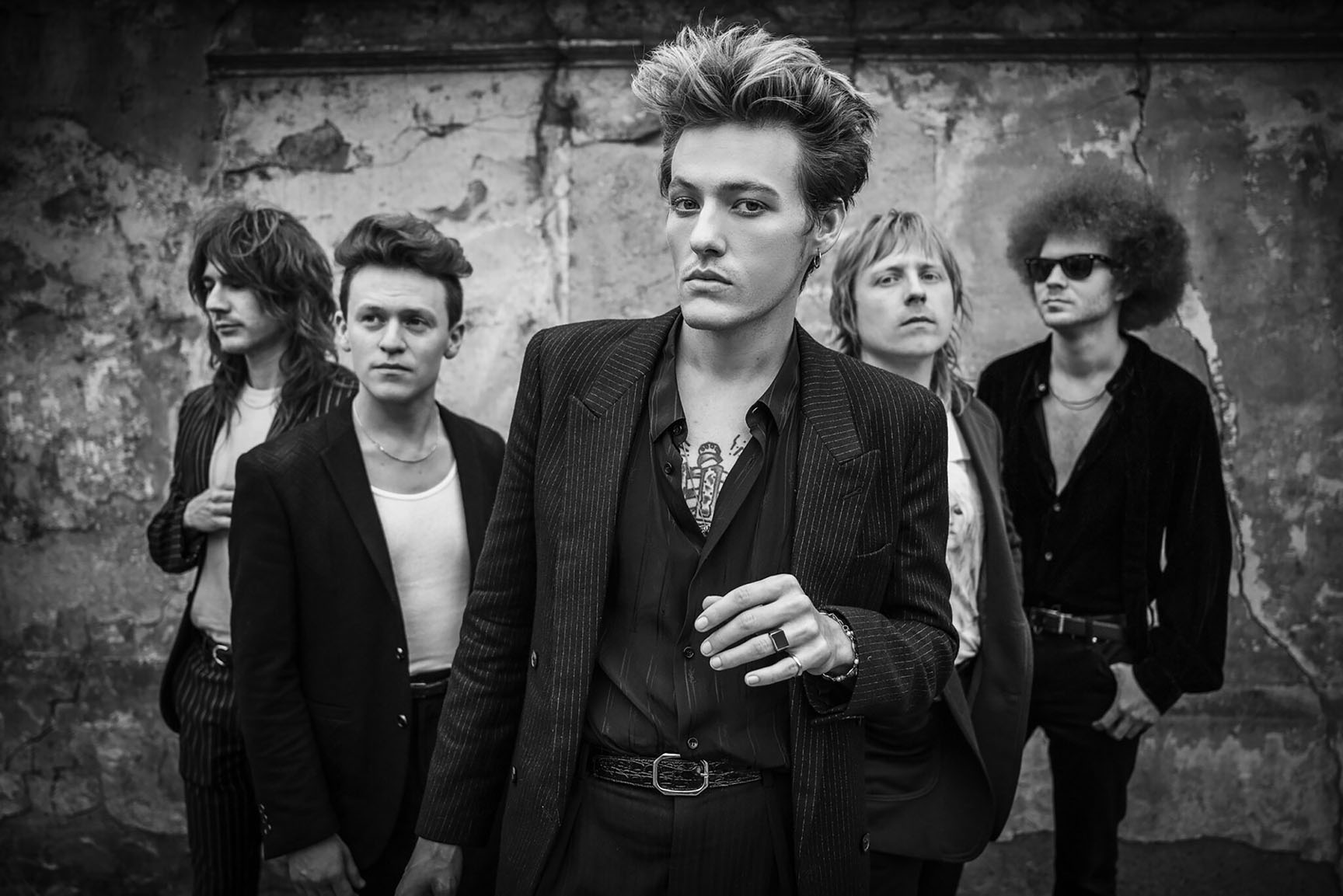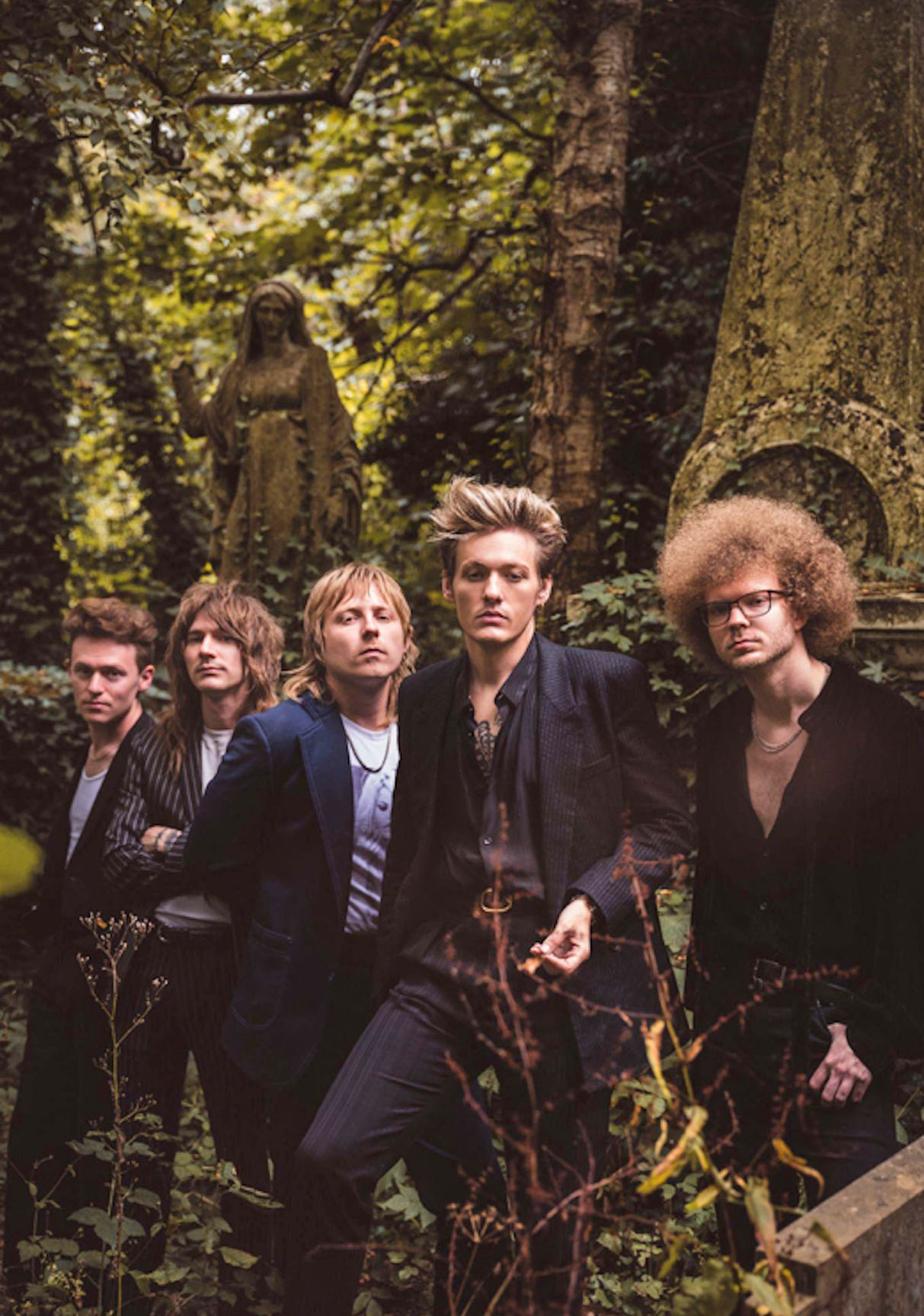
I think it’s safe to say we’re increasingly living in a world where color and joy are systematically being drained from daily life, whether literally, emotionally or spiritually. It’s in times like these that we need music that gives us a shot of adrenaline and injects our surroundings with that extra kick of positive energy we so desperately crave. Enter Chicago-based rock band, Brigitte Calls Me Baby.
With influences like The Smiths and The Strokes, Brigitte Calls Me Baby has translated new-wave style synths, reverb-heavy guitars and tight drum sounds into a sound that’s all their own. Lead singer Wes Leavins completes the package with soaring vocals akin to Roy Orbison or even early Brandon Flowers. What really stands out about Brigitte Calls Me Baby is how they turn this crooner genre on its head with lyrics that are much more fluid and ambiguous than their heteronormative predecessors. Bands Through Town got into all of this—plus cinematic inspiration, the songwriting process and the joys of touring—with Leavins as they prep for a new album and summer tour.
BTT: Can you walk us through the origin story of the band and how you guys all came together?
WL: Yes. Chicago was never on my radar just because I was so—I mean, I’m from Texas—so I was really kind of removed from it. But I had a friend there that I hadn’t quite met in person, but over the internet. We grew closer. And so eventually, we had to come together. And so, I went to Chicago to hang with him. He just showed me around, introduced me to people and places, and I kind of fell in love with the city and just kept going. And through various meetings with various people, just kind of slowly but surely formed the band. First meeting Jack and then David and, eventually our drummer, Jeremy. He introduced me to [our] bassist Devon. And from there it was just, you know, kind of a very organic process, but we found all the right people. Thankfully. Really, if it weren’t for him, I don’t know that I would have ever ended up in Chicago, or meeting at least half of these people that I met there.
BTT: Your vocals are so distinctive and unique. Do you remember the moment that you came into your voice and realized the power of not just your voice, but how you could use it as an instrument?
WL: I actually do, yeah. I was always singing, but I was a bashful singer, and I wouldn’t really do it around anyone. I’d maybe be in my childhood bedroom, but trying to do it where no one could hear me. And at one point I was on the phone with a friend, and I put the phone down. I thought I was within range that he couldn’t hear me. I was going to grab something, and while I was walking, I was singing. And I picked up the phone and he said, “Was that you singing?” And I said, “Yeah.” And he was like, “You’re really, really good.” And that was the first person who told me that. And that changed some things for me too, because I started hearing that more, the more comfortable I got singing around people. And that I think allowed me to strengthen my voice, and over time just get to a place to where now I think it’s… I’m feeling good about it, you know?
BTT: One of the things that I love about your music is the complexity of the arrangements. Can you explain the process of how your songs come together?
WL: Right now, we’re actually in the middle of recording what will be the next album. And so, it’s kind of evolved—the process—a bit. When the band first started, I was in Texas still, a lot of the guys were in Chicago, and so it was more remote. I hadn’t made the full jump to Chicago yet. I was just kind of going every other month or so. And so there was a lot of remote exchanging of demos and things like that. And then now that we’re together far more often, it’s become much more of a collaborative thing, with people showing up in ways that they weren’t able to on the first album. And now, it’s like kind of a treat because, we’re all giving the most that we have to give to the creative process. And before, some of us were limited just because of the logistical stuff.
BTT: And have you found that playing together as an entity and playing live has influenced how you all approach writing, too?
WL: Absolutely. We started live, before we had released any music or really recorded much of the first album. The live thing has absolutely shaped every part of not just the songwriting, but the approach, the way we record. It’s given us a lot more confidence because we’ve had to do it in front of people. So, when you go into the studio, there’s only a few people around, so it’s far less pressure and really just fun.
BTT: And speaking of live shows, I haven’t had the privilege of seeing you guys live yet, but the energy throughout the record is so high-octane that I can only imagine it’s even more amped up when you play live. So, what is the joy of live performance for you?
WL: As cliché as it sounds, it really is the place I enjoy the most. A lot of people don’t enjoy the touring thing, but I very much enjoy it. And I also love being home, but not for long. I find that it’s hard to come down from that, and not much competes with it. So, the live experience for me is everything. And the unknown I really love. I find knowing that anything could go wrong at any moment does something for the thrill-seeking part of me. It’s a privilege to do.
BTT: Do you have any tour essentials that you have to always have with you?
WL: I think the most important thing is being able to bring some kind of familiarity with you. And I love movies, and that’s kind of the big one for me. Since as long as I can remember, that has been a source of comfort for me when I’m home. I love collecting old VHS tapes, so sometimes I’ll bring along my TV that is probably 30-something years old that takes the VHS tapes and bring along my old ’80s horror movie collection. You just put on in the hotel room for the for the atmosphere. It’s just something I grew up with and brings me a sense of home on the road.

BTT: Are there any films or filmmakers that have kind of either consciously or maybe subconsciously like influenced your music?
WL: Yeah, definitely. The aesthetic of movies, especially from the ’40s to the ’90s, there’s so much great stuff. And even now, of course. But it was a time when those things were just, by the nature of creativity, they were new, and they were risky. I find it all to be worth taking something from, worth paying attention to, because it’s at the very least an atmosphere or a vibe thing. David Lynch’s Blue Velvet, for example, is one of my favorites, just aesthetically. Everything about it for me: Even in the stage shot of the lighting, the way that movie’s lit, the colors, the way it’s shot. Those things go into the live show and just kind of lead that a little bit.
BTT: And speaking more about influences, one song that really sticks out to me is “Eddie My Love” because of how kind of Roy Orbison-esque it is. But to me, your lyrical approach is more vague and more fluid. Whereas looking at that period of time during the Roy Orbison era his music is super heteronormative, him and his contemporaries. So, to me, “Eddie My Love” is flipping that narrative. Was that a conscious choice or is that kind of just how it came together?
WL: No, that’s a very, very good observation. You’re the first person to ever notice that. Very intentionally, the album was intended to be a look into the things that we do. And that’s why you might find there’s a lot of variety of atmosphere on the album. And even the subject matter paired with the title, you know, harkening back to sort of titles from that era. And really, it was intended to be an opportunity to showcase the voice and take a song, like you mentioned, and give it new life. The songs of that time are so beautiful and so amazing, but you’re very right; they’re very hetero-normal and very literal. And in some ways, if you’ve heard one, you’ve heard them all. So yeah, I appreciate that observation.
BTT: And I hear a lot of the Smiths on the record, too. Were they a big influence on you? What is it about that reverb-y sound that draws you to it?
WL: Just the dreaminess. I think that quality just kind of sucks me in, always, whether it be The Smiths or even currently Cigarettes After Sex, bands like that. There’s a dreamy quality to all that music. It’s very easy to get lost in thought, head in the clouds, and just go with that. And that’s the main thing I love about those kinds of sounds. I like music that isn’t so in-your-face that you can’t think of anything other than what’s hitting you. There’s room to dream there.
BTT: You mentioned that you guys are working on new music. What can listeners expect? Is it going to be evolving on the same wavelength or a complete change? Can you give us any hints as to what’s kind of in the works?
WL: Definitely. There’s a progression there. And there is an element that was maybe not as prominent on the first record that is a lot larger and on this one. And there’s still a variety, but it’s moving the needle for us a bit further, sonically. There’s a lot to be discovered with this, for sure. With people who’ve heard us before, they’ll find it to be an album that I think will be compelling to them, just because they know us for something, and this is expanding upon that.
BTT: One question that I love to ask is, if you had the ability to erase your memory and hear a record for the first time again, what would it be?
WL: It’s a great question. I think either Is This It?, The Strokes’ first album, or Violator, the Depeche Mode record, and maybe even Jeff Buckley’s Grace. There’s so many, but those are some really popular records that are always on repeat with me and a lot of people I know. And to be able to relive those songs would be pretty rewarding. We all know them so well now that you just kind of take them for granted. I would love to be able to revisit those.
BTT: Is there anything else you’d like to share with our audience?
WL: We haven’t been back to the Midwest in a while, and we’re dying to. You know, being from Chicago and haven’t played there in a while. We’ve got the run in May before we go to the U.K. in June and just can’t wait to see everyone again. And we have something to announce fairly soon in Chicago. That’ll probably be coming in the next couple of weeks. But other than that, just looking forward to going home for a bit, back to Chicago.
BTT: Well, thank you so much, Wes, for your time. This was really fun.
Note: This interview has been edited for length.
